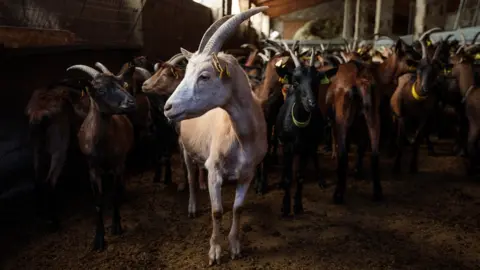EU budget: Plans for farm subsidy cuts but more on security
 Getty Images
Getty ImagesThe European Commission's first multi-year budget after Brexit would try to plug the gap left by the UK's exit from the European Union with taxes on plastic waste and carbon emissions.
The 2021-2027 budget of €1.279tn (£1.1tn; $1.4tn) proposes a cut to agriculture subsidies but more money on security, immigration and research.
It also introduces a mechanism to link funds to observing the rule of law.
The UK is set to exit the EU in March, leaving a hole of up to €15bn per year.
The proposed budget represents 1.1% of the total gross national income (GNI) of the bloc which reduces to 27 nations after Brexit - that number is currently at 1%.
Tensions between Europe's richer countries - which pay more in than they get out - and the poorer countries, which rely on EU funding in order to catch up, look set to sharpen.
The budget must be agreed by EU leaders and the European Parliament. The Commission - the EU executive - said it should be a matter of urgency, and has called for an agreement before the next European Parliament elections in May 2019.
What is proposed?
Agriculture
- Cuts to the two biggest sources of spending: A 5% cut to the Common Agricultural Policy, seeing a budget of €365bn - farming countries like France are likely to be affected - and a 7% cut to so-called cohesion funding - former Soviet states in eastern Europe are its biggest beneficiaries
- Farm subsidies to be better balanced, benefiting medium-sized and smaller farms, and a subsidy cap per farm
Security and migration
- Budget for border management, migration and refugee flows to increase from €12bn to €33bn
- Staff of EU's coast and boarder guard to be expanded from 1,200 to 10,000
Education and research
- 64% increase in research, innovation and digital investment under direct management
- Funding for the Erasmus student scheme doubled to reach more young people from disadvantaged backgrounds
Rule of law
- New mechanism to hold back some budget funds from states considered to be undermining rule of law - a measure that is likely to face resistance from Hungary and Poland, accused of disrespecting those values
Budget Commissioner Guenther Oettinger said: "We invest even more in areas where one single member state can't act alone or where it is more efficient to act together - be it research, migration, border control or defence."
Allow X content?
There will also be new funds to help member states to reform their economies and cope with economic shocks.
"We have put forward a pragmatic plan for how to do more with less," European Commission President Jean-Claude Juncker said. "We will ensure sound financial management through the first ever rule of law mechanism. This is what it means to act responsibly with our taxpayers' money."

Building bridges
By Adam Fleming, BBC News, Brussels
Everywhere you look are measures to bring Europe together.
Boosting the staff of the EU's coastguard is not just about strengthening the external frontier but to re-establish freedom of movement by allowing countries to tear down the internal borders that reappeared during the migrant crisis.
Linking regional funding to respect for the rule of law is a way of using cash to reinforce the EU's values, where political pressure has failed. The Erasmus student exchange scheme will be doubled to groom a new generation of Europeans.
It's all very Jean-Claude Juncker. But like every issue in the EU, it will come down to a battle over who's got more power - the full-throated promoters of integration like the president of the European Commission or the more circumspect leaders of the member states who hold the purse-strings?

What has the reaction been?
In response to the proposed reduction on farm subsidies, France's Agriculture Minister Stephane Travert said "a drastic, massive and blind cut is simply unthinkable".
Dutch Prime Minister Mark Rutte said the plan was "not acceptable" for his country. "A smaller EU means a smaller budget. That calls for spending cuts and ambitious modernisation. What's more, the burden of funding the budget is not shared fairly."
Germany's finance and foreign ministers also called for a fair burden-sharing between the states while Poland's Deputy Foreign Minister Konrad Szymanski said: "The way to the full compromise over the EU budget is still very long."
Where will the new money come from?
The proposals to raise new resources, amounting to €22bn per year, include:
- 20% of the revenues from the Emissions Trading Scheme, which aims to curb global warming and goes to member states
- A national contribution based on the amount of non-recycled plastic packaging waste in each member state - €0.80 per kilo
